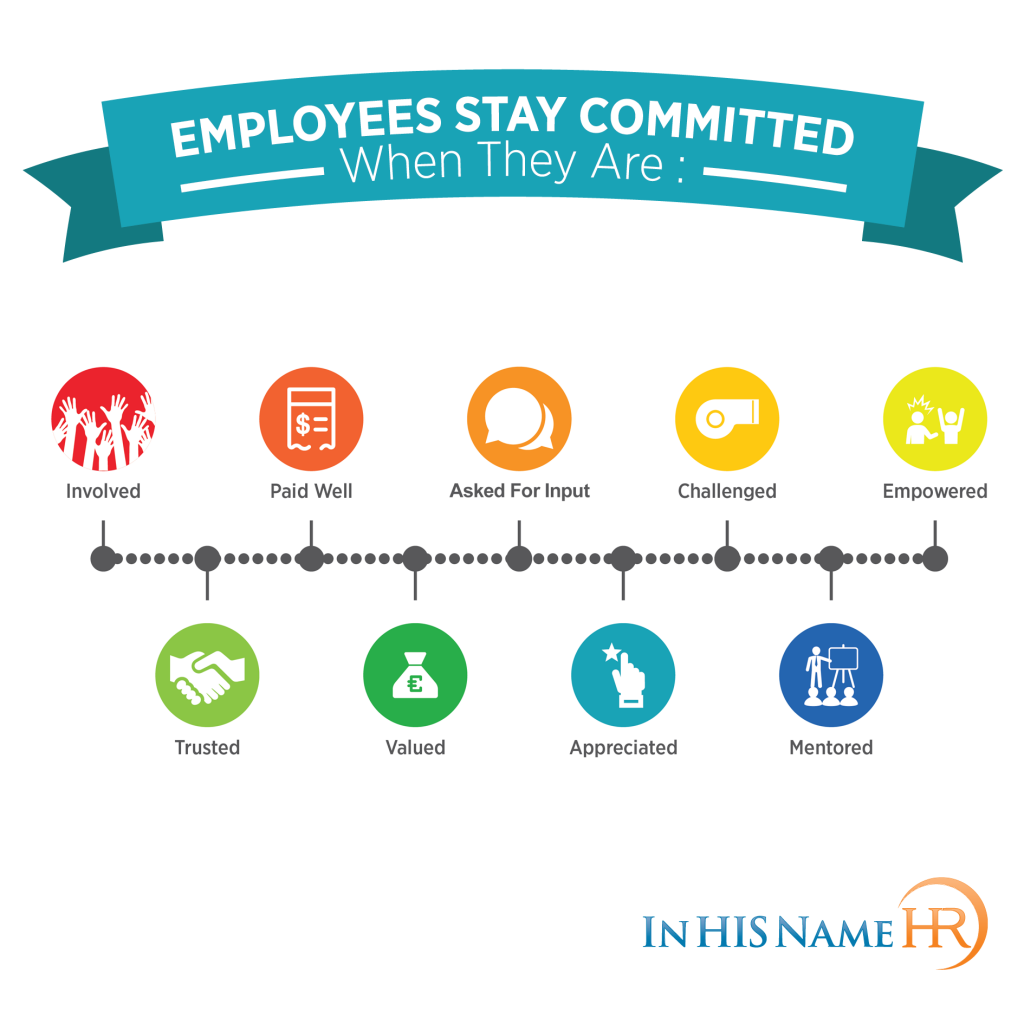
Nov 16, 2018
This blog series focuses on nine areas that keep employees committed to your organization. In our opinion, employees stay committed when they are Involved, Paid Well, Asked for Input, Challenged, Empowered, Trusted, Valued, Appreciated, and Mentored.
Do You Ask Your Employees for Input?
No individual can competently run an organization singlehandedly. And when more than one person is involved in running it, someone needs to be in charge of decision making.
If you happen to be the leader at your place of work, that responsibility largely falls on you. But the fact that you call the shots doesn’t mean the opinions of others don’t count. Your employees have their own opinions, but the question is, how often do you ask them for input?
Why Is Employee Input Important?
Leadership consultants tell us that organizations should announce that they welcome feedback from employees. They should go a step further and actively solicit this input. Employees often have strong opinions but tend to keep them private for fear of offending management or speaking out of turn.
Yet, constructive criticism from employees can improve productivity. As a manager, it’s imperative to ask for and value the opinion of your team members. Employees view issues from a different perspective. And even if you don’t agree with them, a fresh perspective is always welcome.
The results of a survey conducted by the Zenker Folkman firm suggests there is a direct connection between soliciting input and leadership effectiveness. However, a leader doesn’t simply become better by asking for feedback. The correlation stems from the fact that seeking input from employees means a leader is making conscious efforts to get better. And the leaders that get better are those who constantly work to improve their leadership methods and skills. In fact, arguably one of the worst actions an employer can take is to solicit feedback and then ignore it.
How to Go About It
There are many methods to request input from employees. Below are some of the most important or common ones.
Employee-Led Reviews
It’s important to conduct periodic reviews in order to monitor progress. This will help you devise new strategies to reach organizational goals. Although annual performance reviews are already a major part of the culture of many organizations, there are numerous questions that surround their relevance and effectiveness. These questions tend to stem from the approach rather than the process itself. If done right, annual reviews are a great tool through which an employer can gather employee input throughout an organization.
We find that the best review process is one that is led by employees. Have the employee set up the meetings, set goals and objectives, and develop their own career development. When done correctly, and with HR and leadership review, you can move the organization to much higher levels of performance.
Leadership 360° Feedback
A 360-degree feedback system is a method of gathering opinions about the performance of an employee from people connected with the organization.
The process usually involves a complex web of information. Opinions are gathered from virtually everyone in or close to the organization. While this tool can be used to gather information about anybody within the organization, a leader seeking input from employees can use it effectively for this purpose. The most important aspect of a 360° program is confidentiality. One of the best ways to ensure confidentiality is to hire a firm to keep this information protected. Learn more about how In HIS Name HR helps organizations ensure a confidential processhere.
Morale Climate Surveys
These surveys measure the satisfaction of employees with their work environment and the leadership of the organization. They serve as a great way through which employees can provide input on aspects of the organization they are not pleased with.
Start Asking for Employee Input Today!
As a manager or a human resource professional, it’s important to create an enabling environment. This way, employees can provide their input with confidence. But it’s not enough to simply create this environment or ask for input. Organizations should value the input of employees by listening to their suggestions.
Getting what you think is ridiculous advice? Have a talk with the employee. Clarify what is being communicated. When you listen first, and then explain your perspective and organizational goals, it gets employees thinking on track over time in terms of viable suggestions.
Most importantly, implement changes when you get great advice.

_________________________________
In HIS Name HR helps organizations build high-performance Human Resources programs. Visit them at In HIS Name HR.
Mark A. Griffin is the founder and chief consultant of In HIS Name HR LLC. Connect with him on LinkedIn or Twitter.
Mark A. Griffin | Blog, Christian Higher Ed HR, Human Resources

Nov 9, 2018
This blog series focuses on nine areas that keep employees committed to your organization. In our opinion, employees stay committed when they are Involved, Paid Well, Asked for Input, Challenged, Empowered, Trusted, Valued, Appreciated, and Mentored.
Are Your Employees Paid Well?
In our last post we discussed the concept of employee involvement in the workplace. The next area focuses on helping readers understand the concept of being paid well in the workplace. Most organizations look at several areas of compensation: standard pay, perhaps health and wellness and retirement benefits, and, in some industries, bonus programs or long-term financial incentives. For the sake of brevity we will discuss two areas, standard pay and general generosity with your employees.
Standard Employee Pay
We often do compensation studies for organizations, including churches, ministries, for-profit and non-profit companies, and colleges. These studies are very important for all organizations, and should be performed at least every five years. You also should look internally at your compensation structure, being mindful of internal equity issues, especially as it relates to disparate treatment between protected-class employees.
“Most companies try to be good about keeping it up-to-date, but they tend not to do it as quickly as they should,” says Steven Slutsky, a director at Pricewaterhouse Coopers Human Resource Services in Philadelphia.
Doing a full-blown compensation study not only helps you to understand internal equity and current compensation market conditions but also helps promote a greater organizational image to your employees when they know you are performing this type of study. It is a great morale boaster, even if the wages don’t shift upward.
The most often question that we are asked is, “How do we even begin to do a salary study?” We always start the same way—leading organizations to undertake a total update and rewrite of all job descriptions across the organization. This establishes a solid baseline of what employees are doing and why.
General Generosity with Your Employees
Good-standing employees deserve more than fair wages. Scripture says, “Do not muzzle an ox while it is treading out the grain,” and “The worker deserves his wages.”
Wow, the ox was permitted to eat during its workday. Sadly, many organizations don’t extend the same consideration to the most valuable commodity of their organization—their employees. Many years ago I witnessed a young teen working at a local pizza shop, making minimum wage. The owner was a cruel, selfish man who refused to provide any food or beverage to his employees unless purchased at full price. The owner’s children would come in and help themselves to all kinds of food, which they left behind, half-eaten, to be thrown away, but the floor sweepers got nothing. The shop owner also insisted upon destroying any leftover, unsold items at the end of each evening rather than offering them to his employees. Dear leaders, please do not fall victim to becoming a tyrant in your workplace. Be generous when you can. It is an investment that pays huge dividends in any organization.
Be generous to your people and you shall be rewarded.
Some of the most impactful gestures of gratitude and appreciation that I have given my people were the least costly—small lunch celebrations, or boxes of favorite chocolates. If you act with kind regard, with generous giving, you are building a strong Kingdom-minded organization while honoring Christ.
Remember: Virtually every single employee will give you 100 percent when they know you care.
Lastly, in relation to this premise, it is important to reflect on this piece of scripture.
1 Timothy 6:17-19: 17“Command those who are rich in this present world not to be arrogant nor to put their hope in wealth, which is so uncertain, but to put their hope in God, who richly provides us with everything for our enjoyment. 18Command them to do good, to be rich in good deeds, and to be generous and willing to share. 19In this way they will lay up treasure for themselves as a firm foundation for the coming age, so that they may take hold of the life that is truly life.”
So why are we sometimes hesitant to share with the very people we should care about the most? We need to be more generous, because in the end we really are left with nothing to take with us.

___________
####
Mark A. Griffin is founder and Chief Consultant at In His Name HR LLC. He has over 20 years of HR experience. In His Name HR helps organizations build high-performance Human Resource programs. Visit them at In HIS Name HR or Send Email
Mark A. Griffin | Blog, Christian Higher Ed HR, Human Resources

Nov 1, 2018
This blog series focuses on nine areas that keep employees committed to your organization. In our opinion, employees stay committed when they are Involved, Paid Well, Asked for Input, Challenged, Empowered, Trusted, Valued, Appreciated, and Mentored.
Are Your Employees Involved?
In an article in Fortune magazine, Dan Schawbel stated that the primary priority for business leaders would be “retaining employees in a competitive talent marketplace.” He added, “In a new study by Future Workplace and Kronos, we found that 87% of employers said that improving retention is a critical priority for their organization.” Mr. Schawbel’s suggestion to focus on retention is spot on.
Let’s start with the first area, Involved. Oftentimes, when we first engage with an organization, leadership asks us to implement programs to immediately improve employee relations. We hear, “Employees are leaving in droves,” that turnover is high. Or “Our pay is too low. We repeatedly lose people to organizations that pay slightly more.” Excuses and explanations abound. But when we ask the key question How do you know the true reasons people are unhappy or why they are leaving?, the explanations are generally theoretical or hypothetical, not fact-based.
Our first suggestion to any organization: Don’t make changes or implement programs without first determining what the core issues are. Doing so is a waste of money and time, and can also hurt your organization’s culture and morale. That is where being involved comes into play. Use a skilled facilitator to run employee focus groups. Include representatives from each department. Have those same representatives talk to their departmental colleagues about what might be important to address.
One area many organizations bypass is the exit interview. An exit interview is a valuable tool to collate critical data and ascertain employees’ true reasons for leaving. Ask simply whether they felt involved in their departments, and with the rest of the organizational team. Ask them to suggest how your organization could do better in this area.
Finally, one of the best ways to uncover potentially problematic issues in your organization is to conduct confidential 360-degree feedback assessments of your leadership staff. Used the right way, it reveals key trends in certain areas of employee relations. As a plus, your findings can also serve as a tool for organizational-wide leadership development.
Most important: When employees are given access to their leadership, they walk away not only feeling heard but also involved in the organization.
####
Mark A. Griffin is founder and Chief Consultant at In His Name HR LLC. He has over 20 years of HR experience. In His Name HR helps organizations build high-performance Human Resource programs. Visit them at In HIS Name HR or Send Email

Mark A. Griffin | Blog, Christian Higher Ed HR, Human Resources

Oct 29, 2018
The #MeToo Movement and a Biblical Approach to HR Practices
There’s never been a more urgent time than now to have HR professionals who are grounded in sound biblical principles. With the rise of the #MeToo movement, human resources consultants are in high demand as companies, churches, and organizations ensure best practices and deal with existing charges. How should biblical principles and economic thinking impact the way we approach human resources?
Mark A. Griffin | Blog, Christian Higher Ed HR, Human Resources

Oct 1, 2018
Enjoy listening to Guest Mark A. Griffin discuss “Human Resources and Higher Education” with host Drumm McNaughton, PhD.
Have iTunes? Podcast available through iTunes.
The Change Leader Inc. creates sustainable organizations that meet the needs of the 21st century students andemployers while implementing change in way that enables them to remain true to the history and values that made them successful.
About Mark: With over 20 years of Human Resources experience at both fortune (Kodak, Quaker Oats, and Merck) as well as small and mid-sized companies, Mark has seen it all.
Mark A. Griffin | Christian Higher Ed HR, Human Resources, Podcasts

Sep 24, 2018
Poor employee performance hurts an organization. Low productivity, incompetence, and unneeded expenses are the last thing organizations want at any time, particularly in today’s tough economy.
After decades of work in the field of business and human resources, I know that few things upgrade and energize an organization like a solid Performance Management System. A performance management system incorporates your organization’s Mission, Vision and Values as well as your annual goals and objectives to create the structure and accountability by which an employee can accomplish these goals and objectives and, more importantly, improve their lives. Only the highest-performing organizations make the performance review process a valued, appreciated, and eagerly anticipated system for the both organization and its employees.
Instead, what usually happens?
Sadly, many organizations do not systematically review or improve employee performance at all! This leads not only to unmet expectations from the management’s point of view, but also creates confusion and frustration for employees. The result is poor performance and money down the drain. Other times, organizations attempt to implement a yearly review but end up doing it backwards and it becomes counter-productive. This article will teach you how avoid this pitfall.
Have you ever weathered “The Dreaded Annual Review Meeting?”
Television and film have lampooned the phenomenon, highlighting the common foreboding employees feel and the waste of time such a meeting can be. How can you implement a Performance Review System that will consistently improve employee productivity and competency, save costs, and have eager employees lining up for it?
Start by avoiding these two biggest, most critical mistakes…
Mistake # 1 The leader fails to include input and participation of the employees at the beginning of the process.
The best performance programs are employee-driven. The leadership works in a “guide and support” role. This is a significant shift, but one that can make or break your organization. When the process of improvement and review is centered on and driven by the employees, it creates an emotionally potent sense of ownership and cooperation. Instead of being hounded and rebuked by a controlling boss, the employee is the source of increased performance through an active and vested role.
It behooves an employee to generate high performance and a good system will take this into account by providing employees the dignity of being responsible to see the improvement process through to the end. The performance program should encourage and reward employees who initiate performance conversations with management. A program executed well will encourage the employee to want to do better as he/she makes the efforts necessary to ensure it happens.
Mistake #2 Leaving out personal development.
Never forget the vital career development component. A simple career development piece can do wonders for employee morale and can be easily built right into your performance program. Employees naturally want to improve their lives and better their circumstances. A career development component helps employees know, envision, and subsequently achieve promotions, positions, and greater responsibility within your organization.
A career development focus gives the employee the opportunity to take ownership of their career destiny.
A good career development component helps the employees ascertain what they need to do to close the gaps in their experience and education in order to be promoted to other positions. Many great programs include education and seminars, but some cleverly include short-term assignments in other positions to gain vital hands-on experience.
Implementing a proper performance program may seem daunting, remember that employees are not just your greatest assets; they are the key to ensuring that you can thrive in challenging economic times.
___________
In His Name HR helps organizations build high performance Human Resources programs. Visit them at In HIS Name HR or e-mail them here.
Mark A. Griffin is the founder and chief consultant of In His Name HR LLC. Connect with him on LinkedIn or Twitter.
Mark A. Griffin | Christian Higher Ed HR

Sep 5, 2018
Position Closed
Looking to make a difference in our world? It’s time to use all of your education and experiences to be an instrument of change.
In HIS Name HR is honored to have been retained by Men of Iron to seek their next Director of Operations.
The leadership of Men of Iron believes men are distinctly called to be Godly leaders in their families, their churches and their communities. Men of Iron equips men and grows Godly leaders through creating and sustaining 1-to-1 and micro group mentorships. They partner with leaders, influencers, churches and communities to implement and execute a culture-changing men’s ministry.
Step up to the plate and be part of changing a culture, one man, one family, one church and one community at a time.
Director Of Operations
The Director of Operations is a core function of Men of Iron, responsible for leading, growing, scaling and organizing the ministry by overseeing its programs and services (Strong27™). He creates and provides strategic guidance to grow a regional model and is expected to develop and execute creative strategies, operations and systems to grow and scale men’s mentorships around the world.
He is the leader of ministry staff and representatives through his leadership, management and accountability characteristics. He is the 2nd most senior manager of Men of Iron’s operational hierarchy and holds the position of Integrator.
Some Essential Responsibilities
- Lead, grow, scale and organize all programs and services (Strong27™)
- Create and provide strategic guidance to grow a regional model
- Develop and execute creative strategies, operations and systems to grow and scale Men of Iron’s programs and services around the world
- Develop and manage quantitative and qualitative metrics based around sharpening men and strengthening families, churches, and communities, as well as growth of the ministry
- Provide leadership, management and accountability to all operations staff
- Work with Executive Director to create vision for all Men of Iron programs and services and to create and execute a strategic plan
- Develop and manage annual budget for all programs and services
- Develop systems and operations to efficiently increase the number of active mentors and protégés each year
- Develop systems and operations to efficiently increase the number of church and community partners each year
- Develop a professional training and development program for all ministry ambassadors and directors
Some Position Requirements
- Bachelor’s degree in Business, Ministry and/or other related education AND 7-10 years related experience and/or training in the following area:
- Business and management experience
- Business or ministry operations in medium to large setting with qualitative and quantitative metrics
Or equivalent combination of education and experience.
- Successfully leading, growing and scaling a business or business operations.
- Must be computer literate. Working knowledge of Apple operating systems and Microsoft 365. Able to navigate and become familiar with CRM software.
- Must be able to produce a statement of Faith.
- Complete support of and willing adherence to Men of Iron’s mission, vision and core values, applicant must hold these standards as his own.
Cover letters should include why you should be considered for the position and what would make you the best candidate.
Serious and confidential inquiries: Apply Through Indeed
Want to get future vacancies and blog updates? Subscribe here: Click
Mark A. Griffin | Now Recruiting For

Sep 4, 2018
With operations in Melbourne Australia, The Ambitious Entrepreneur Podcast Network hosts weekly podcasts, broadcasting inspiring and informative interviews to an expansive growing audience worldwide.
Enjoy listening to Guest Mark A. Griffin discuss “Don’t ask what God can do for you; ask God what he wants you to do for him!” with host Annemarie Cross.
Have iTunes? Podcast available through iTunes.
The Ambitious Entrepreneur Podcast Network is the voice for Entrepreneurs and Small Business, featuring business experts, Thought Leaders, Disruptors, Innovators and Change Makers who are making a real impact in the world with their message.
About Mark: With over 20 years of Human Resources experience at both fortune (Kodak, Quaker Oats, and Merck) as well as small and mid-sized companies, Mark has seen it all.
Mark A. Griffin | Human Resources, Podcasts

Jul 31, 2018
Most employees loath them; many managers avoid them. High Performance Organizations have them, and they do what they’re designed to do—evaluate precisely the performance of each employee.
Feel like you don’t need them? Here are 10 great reasons that should change your mind.
- Aligning performance to goals and objectives
Most organization employees we meet with say they have no idea what the yearly top two or three goals are for their organization. A great performance program sets these goals as their starting point. Ninety-nine percent of employees in this country want to do well at work, but we lack leaders who know how to align their desire to achieve to the organizational goals.
- Providing a basis for promotion/transfer/termination
Many organizations are not transparent concerning how to be promoted. A performance review process more readily identifies those employees who deserve promotion and those who require lateral shift (transfer) or need to enter into a remedial program. This system also aids career planning.
- Enhancing employees’ effectiveness
Most people really do want to be better at their jobs! Helping employees to identify their strengths and weaknesses and informing them of the organization’s expectations concerning their performance helps them to better understand the role they play and increases work efficiency. Feedback reinforces good performance and discourages poor performance.
- Aiding in designing training and development programs
Instead of creating “programs of the month,” you can use performance review data to more accurately ascertain training needs and identify skills that need to be developed in order to tailor-make the most effective training and development programs.
- Building teams
Counseling employees corrects misconceptions, which might result in work alienation. Performance management also helps employees to internalize the norms and values of the organization. (I have met leaders who have not talked to their employees about their performance since 2009!)
- Removing discontent
Performance management puts all employees on the same measuring tape. Identifying and removing factors responsible for worker discontent motivates them to perform better at work. Performance management helps to create a positive and healthy work environment in the organization.
- Developing interpersonal relationships
Relations between superiors and subordinates can be improved through the realization that there exists a mutual dependence that leads to better performance and success. By facilitating employees to perform introspection, self-evaluation and goal setting, their behavior can be modified. Better interpersonal relationships lead to team building.
- Aiding wage administration
Performance management can help to develop fairer and more equitable base lines for reward allocation, wage fixation, raises, incentives, etc.
- Exercising control
A performance review process provides a means to exercise control of projects focused on, and helps keep employees aligned to the agreed upon annual goals and objectives.
- Improving communication
Performance management serves as a mechanism for improved communication between superiors and subordinates. Often times managers shy away from counseling employees. When the right system is in place, especially is it is employee driven, it forces discussions on a regular basis.
In closing, my experiences lead me to support employee driven programs. Programs that rely on managers and leaders have a higher propensity for failure. Simple yet meaningful programs that include goals, objectives, behaviors, an employee development component and stretch assignments meet what most employees’ desire.
How important are employee performance reviews in your organization? We would like to know. Please leave comments below.
_________
In His Name HR helps organizations build high performance Human Resources programs. Visit them at In HIS Name HR or e-mail them here.
Mark A. Griffin is the founder and chief consultant of In His Name HR LLC. Connect with him on LinkedIn or Twitter.
Mark A. Griffin | Blog, Christian Higher Ed HR

Jul 23, 2018
Position Closed
We are excited to be retained by this wonderful organization, Utility Keystone to assist in recruiting a Chief Financial Officer for their Manheim PA location. With over 30 years in the industry Utility Keystone continues to build its legacy of providing the ultimate customer experience.
Purpose of Position
The CFO is accountable for the financial operations of the Company, including the development of operational and financial metrics to assess alignment to the Company’s plan. Through their leadership, they set policies and procedures designed to protect the Company’s assets from theft or misuse by establishing and maintaining effective internal controls and processes and report accurate financial results. As a member of the Leadership Team, the CFO works closely with the President and Department Heads to provide accounting supervision for all locations, as well as provide essential support to the Sales, Service, Parts, Inventory and Lease and Rental.
Some Of The Essential Duties
Planning
- Assist in formulating the company’s future direction and supporting tactical initiatives
- Monitor and direct the implementation of strategic business plans
- Manage the capital request and budgeting processes
- Develop financial and tax strategies
- Provide financial and tax counsel to President and Owners of related entities
- Provide financial analysis tools to evaluate company ventures, special projects, capital expenditures, etc.
Operations
- Participate in key decisions as a member of the executive Leadership Team
- Create and manage financial controls and accounting procedures
- Manage the accuracy and productivity of day-to-day activities of accounts payable, accounts receivable, credit/collections, cash disbursements, invoicing, inventory integrity, fixed asset records and cash handling
- Implement operational best practices
- Monitor and approve payroll
- Provide oversight on various filings for dealer license, banking license, FET, sales tax,
- 1099, etc.
Financial Information
- Prepare timely monthly and annual financial statements
- Report financial information to President, LT members and banks
- Coordinate all audit activities and investigate their findings and recommendations
- Provide cash management reporting and forecasting
Third Parties
- Lead relationship with accounting firm, bank(s), insurance agents, credit card companies and collection agencies
- Manage and maintain commercial casualty/liability insurance
- Participate in health insurance renewal
Required Personal Attributes
- Excellent verbal and written communication skills
- Excellent organizational, time, and stress management skills to complete the required tasks
- Ability to learn quickly in a fast—paced environment
- Self—confidence
- Proactive to forecast and foresee potential issues
- Ability to perform and execute strategic planning
- Excellent leadership skills
- Excellent problem—solving skills
- Strong people skills
Position Requirements
- Bachelor’s degree in Accounting plus 10 years’ experience in senior financial management position; or equivalent combination of education and experience. CPA designation and/or MBA preferred.
- Experience in streamlining financial systems and processes
- Experience in supervision or management of employees
- Proficient in Microsoft products.Strong knowledge and experience in using service operating systems a plus. Use of all current technology as a communication and efficiency tool is a must.
- Complete support of and willing adherence to Utility Keystone’s mission, vision and core values.Applicant must hold these standards as his/her own.
Cover letters should include why you should be considered for the position and what would make you the best candidate.
Serious and confidential inquiries: Apply Through Indeed
Want to get future vacancies and blog updates? Subscribe here: Click
Mark A. Griffin | Now Recruiting For











